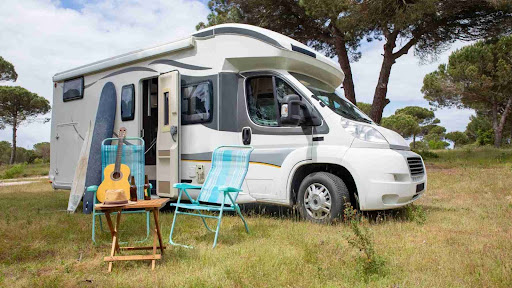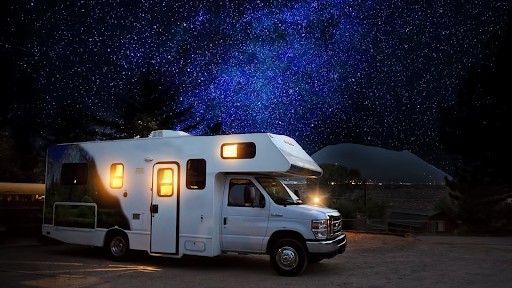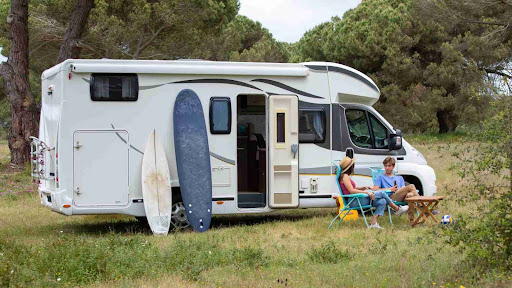I remember the first time I drove an RV—it was one of those spontaneous decisions that turned into a full-fledged adventure. My friends and I were planning a weekend getaway, and when we couldn’t decide who should drive, someone jokingly suggested, “Why not just rent an RV?”
After a few clicks on my phone, I found myself in front of a massive Class C motorhome, staring at the steering wheel, wondering, “Do I need a special license to drive an RV?”
Well, long story short: no, not usually. But there are some important things to consider before you take the wheel and hit the open road.
Whether you’re renting a cozy camper van for a weekend escape or taking a luxurious Class A motorhome on a cross-country adventure, the rules vary depending on the size, weight, and even where you’re driving.
Here’s the full scoop on whether you need a special license to drive an RV.
What’s the Deal with RVs and Licenses? Do You Need a Special One?

In most cases, a standard driver’s license is all you need to drive an RV. That’s right—your everyday Class D license (in the US) is good to go for most RVs, including many Class B camper vans and Class C motorhomes.
If your RV’s Gross Vehicle Weight Rating (GVWR) is under 26,000 pounds, you’re typically clear to drive with your regular license.
But here’s where it gets a bit more interesting. When you start dealing with bigger rigs, like those huge Class A motorhomes or truck-and-trailer setups, the rules change.
Some states (and even countries) require a special license if your RV exceeds certain weight or length thresholds.
Let’s break this down a little further.
How Heavy Is Your RV? Does the Weight Really Matter?

So, does the weight of your RV really make a difference when it comes to licensing? Yep, it does! Here’s the basic rule of thumb:
- Most RVs (under 26,000 pounds): You’re good to go with just your regular driver’s license in most places.
- Larger RVs (over 26,000 pounds): This is where things get tricky. States like California, New York, and Texas have specific requirements for RVs that exceed 26,000 pounds. You might need a non-commercial Class A or B license or, in rare cases, a Commercial Driver’s License (CDL).
If you’ve been eyeing that massive Class A motorhome or planning to tow a huge trailer, it’s a good idea to check the specific requirements in your state before hitting the road.
What About Towing? Do You Need a Special License to Tow an RV?

Ah, the joy of towing—whether you’re hauling a trailer or a fifth wheel, you’re in for a whole new ball game when it comes to licensing.
If the combined weight of your tow vehicle and trailer exceeds 26,000 pounds, then yes, some states may require a special license or endorsement to handle the towing job. Again, this depends on where you’re driving.
For example, if you’re towing a heavy trailer with your SUV or pickup truck, and the total weight is over the 26,000-pound mark, you might need a non-commercial special license to drive in states like California or Florida.
Do States Have Different Rules? How Do You Know What You Need?
Yes, yes, and yes. This is the part that always gets people tripped up—different states have different rules.
You might need a non-commercial license in California, but in Michigan, you could be fine with just your regular license.
Here’s the best tip: Check your local Department of Motor Vehicles (DMV) website or equivalent in your state.
They’ll have the most up-to-date information on what’s required. If you’re renting an RV, the rental company will usually let you know if you need any special licenses based on the model you choose.
International Adventures: Do You Need a Special License to Drive an RV Abroad?

Planning to take your RV adventure global? Keep in mind that driving an RV in another country comes with its own set of rules.
In the UK, for instance, a Category C1 or Category C license is needed depending on the weight of the RV.
Before you book your tickets and hit the road, make sure to check if you need an international driving permit or a country-specific license to drive the RV. It’s always better to double-check than to get stuck at a border!
FAQ Time: Answering Your Burning Questions About RV Licenses
Do I need a special license to drive an RV if I’m renting?
If you’re renting an RV, most models under 26,000 pounds won’t require a special license. However, some larger rentals, like Class A motorhomes or large trailers, may require a special endorsement or license. Check with the rental company before you pick up your RV.
What is the maximum RV weight before you need a special license?
The magic number is typically 26,000 pounds. If your RV or combined tow weight exceeds this, you may need a special non-commercial or commercial license, depending on your state. Always verify the specific rules in your state!
Can I drive a large RV without a CDL?
Most likely, yes. In the US, only a handful of states (like Wisconsin and Washington D.C.) require a CDL for RVs over 26,000 pounds or longer than 45 feet. For most states, a non-commercial Class A or B license should be enough for bigger rigs.
So, Do You Need a Special License to Drive an RV?
In short, if you’re cruising around in a standard RV under 26,000 pounds, your regular driver’s license should suffice. However, for heavier or longer rigs, especially when towing, a special license or endorsement might be required. Always check your state’s DMV rules before hitting the road.
The Final Word: Hit the Road, But Know the Rules
Whether you’re a newbie hitting the road for the first time or an experienced RV traveler, understanding the licensing requirements before you head out is essential.
No one wants to end up at a DMV counter, scrambling for answers!
My best tip? Always call ahead and double-check.
The rules might differ from state to state, but a little preparation goes a long way. That way, you can spend more time enjoying the scenic route and less time stressing about paperwork.
Ready to hit the road? Just make sure you’ve got the right license, and you’re good to go! Safe travels, and happy RVing!

